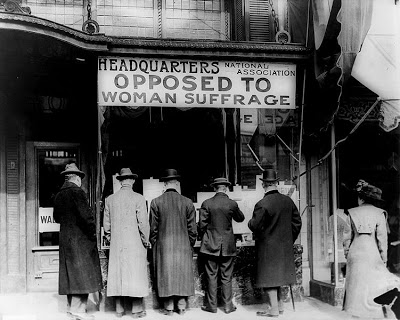Equal rights in America:
The legacy of the Fourteenth Amendment
A misguided and wrong-headed Dred Scott-type decision by the Supreme Court could set [gay rights] back by many years…
By Ted McLaughlin / The Rag Blog / September 26, 2010
The fight for equal treatment for all Americans by their government has been a long and hard-fought battle, and it still has not been won. Although our Founding Fathers loved to talk about democracy and equal rights, the country they created did not initially give equal rights to all of its citizens. In fact, the only people who could vote in the newly-created nation were white male property-owners.
Fortunately they gave us not only a dream of equality, but also a Constitution that could be interpreted and amended to further the cause of granting equality to all citizens. After the Civil War, the Constitution was amended for the fourteenth time. That Fourteenth Amendment not only guaranteed that former slaves were to be guaranteed the full rights of an American citizen, but has also been used by the Supreme Court since that time to guarantee the rights of many others.
Thanks to the Fourteenth Amendment and Supreme Court decisions regarding it, most Americans now accept that things like race, ethnicity, sex, and age should not bar any citizen from equal protection and equal rights in America (although some battles are still being fought to fully realize these rights). The newest battle for equal rights is now being fought over sexual preference. There are many in this country, especially religious fundamentalists, who still believe that gays and lesbians should not share the same rights as other Americans.
I know that most of these people use their religion as an excuse to deny rights to other Americans, but I tend to think that there are just some that need to have another group of people to look down on — maybe to boost their own feelings of inadequacy. After all, religion was also used to deny equality to minorities and women. Those “religious beliefs” have fortunately been largely overcome, and now the battle is being fought over extending full equal rights to American homosexuals.
Currently the battle is being waged on two fronts — equality in the military and equal marriage rights. Recently the right-wingers in the United States Senate (mostly Republicans) refused to allow a Defense Appropriation bill to come up for a vote by invoking cloture (ending unlimited debate). T
hey did this because the bill included a provision that would end the “don’t ask, don’t tell” policy (DADT) of the United States military. DADT is a military policy that dictates the expulsion of gays/lesbians who don’t hide their sexual preference from their fellow soldiers and the military command structure.
Homosexuals have always served proudly and bravely in the military of the United States. To force them to hide their sexual preference and live a lie is a basic denial of their equal rights as citizens of this country. It also denies this country the service of many qualified and valued military professionals simply to satisfy the bigotry of some Americans — people who would not be affected in the least manner by granting homosexuals the right to serve their country (the same right all others, including non-citizens, are granted).
But I think the DADT policy will soon be a thing of the past. We may have to wait until the election is over, since many right-wingers and “blue dogs” are currently playing to their base of social conservatives, but it will end. A clear majority of people in America are opposed to DADT and its days are numbered.
The much harder fight is over granting gays/lesbians the right to marriage (with all its legal and social ramifications). Several states have granted this right but many others have not, and of those who haven’t many are refusing to grant the constitutional “full faith and credit” recognition to legal marriages conducted in states that allow homosexual marriage. This is a question that will soon be decided by the United States Supreme Court.
Sadly, it seems that some right-wing Supreme Court justices are already positioning themselves to deny equal rights to homosexuals — sort of a latter-day Dred Scott decision. One justice, Antonin Scalia, recently declared that the Fourteenth Amendment does not cover or grant equal rights to women. He said the amendment was only meant to grant equal rights to former slaves when passed in the late 1800s, and therefore should be limited to that purpose.
Scalia went on to say that he was in favor of equal rights for women, but it should be done through state or federal law and not because these rights are covered by the Fourteenth Amendment. Unfortunately, he is not the only justice that feels this way (in spite of many Supreme Court decisions to the contrary). The past decisions and writings of Justices Thomas, Alito, and Roberts show that they also would be open to a similar interpretation of the Fourteenth Amendment.
Now I don’t think any of these justices, including Scalia, are actively trying to deny equal rights to women (although a decision that the Fourteenth Amendment referred only to former slaves could be used that way in the future). What they are really trying to do is justify a decision that the Fourteenth Amendment does not grant equal rights to those discriminated against because of their sexual preference. If they can deny women’s coverage by the Fourteenth Amendment, that makes it easy to deny coverage to homosexuals.
I am an optimist. I believe that full equal rights will someday be granted to all American citizens — including homosexuals (and bisexuals and trans-gendered individuals). It is simply the right thing to do. But a misguided and wrong-headed Dred Scott-type decision by the Supreme Court could set this back by many years (and even open up opportunities for legal discrimination against other groups).
It is conceivable that the court is just one vote away from severely restricting the scope of the Fourteenth Amendment. At this point all we can do is cross our fingers and hope that wisdom prevails on the court. The alternative would be a huge step backwards for America.
Why is the concept of equality for all so hard to understand for many Americans?
[Rag Blog contributor Ted McLaughlin also posts at jobsanger.]




















“Homosexuals have always served proudly and bravely in the military of the United States.”
In my own case, there wasn’t really much pride or bravery involved. Mostly I was relieved when my four years were up that I had managed to put my time in without getting killed or caught — killed in the dirty little imperialist war in the Caribbean Lyndon Johnson sent me into or caught committing felonies with my fellow soldiers or with the many civilians (who maybe liked the uniform). I was relieved later that the GI-bill money lasted long enough to get me a degree.
What I was, and am, proud of, and what maybe took a little emotional bravery, was opposing every war the United States has waged or threatened to wage in the 42 years since I got out of the army and to have done so in such good company, a considerable portion of which has been as homosexual as I am.
Progressives cheer on veterans who oppose wars and toss their medals back at the Pentagon and they try to talk kids out of enlisting. And then with no hesitation agitate for the rights of lesbians and gay men to enlist. I realize that having a right to do something and doing it are not the same, but, still, I think there is a contradiction here that progressives igonore a little too blithely.
Once Don’t-Ask-Don’t-Tell is repealed, will the progressives who fought to have that happen then organize to talk gay people out of enlisting?